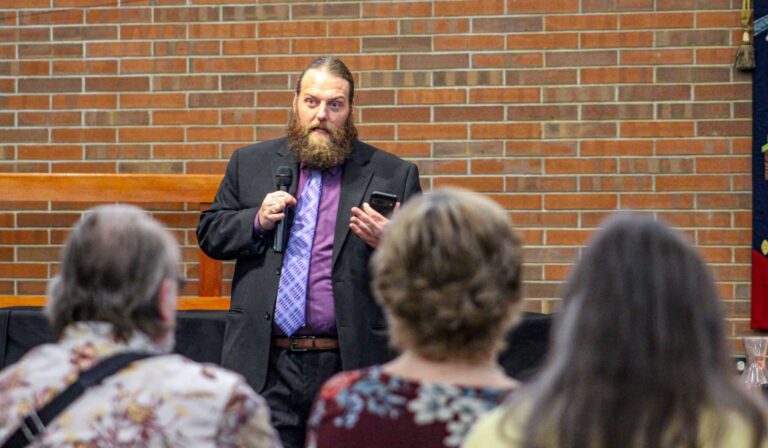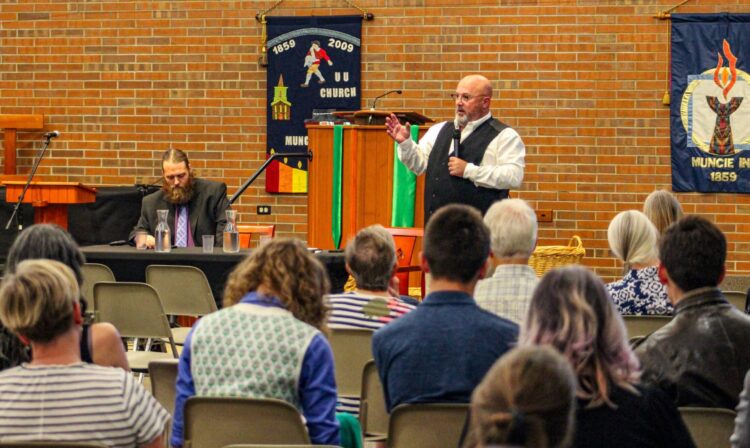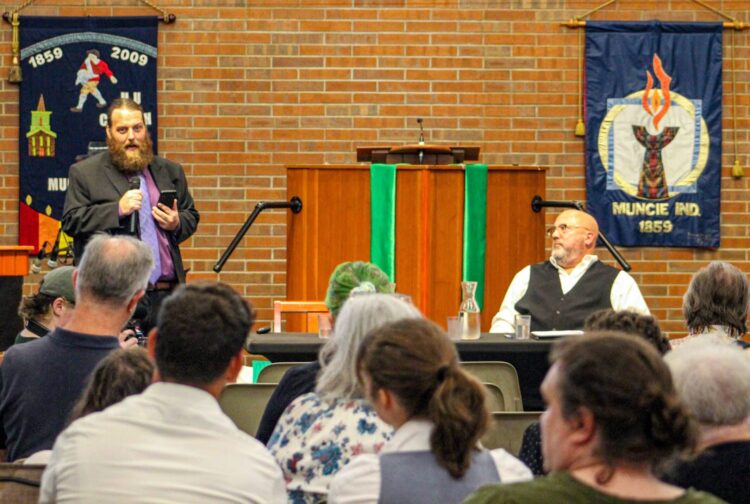
By Sydney Byerly
The Indiana Citizen
October 6, 2025
MUNCIE, Ind. — Concerns over Indiana public schools releasing students to attend off-campus Bible study during the school day brought more than 50 residents to the Unitarian Universalist Church last week for a community forum titled “Protecting Public Schools from Religious Influence.”
The event, organized by Muncie Resists with support from the League of Women Voters of Muncie-Delaware County and the Secular Education Association, came as LifeWise Academy plans to launch its school-hours Bible study programs at Muncie Community Schools and other nearby districts.
Lifewise Academy, an Ohio-based nonprofit, provides “release-time” religious instruction that takes children off campus during the school day — a practice permitted under a 1952 U.S. Supreme Court decision and a 2024 Indiana law. The Indiana state statute requires schools to approve parental requests for up to 120 minutes of weekly off-site religious education.
Speakers included Zachary Parrish, the co-founder of Secular Education Association, a group launched in 2023 in response to worries about LifeWise, and Michael Shaffer, a professor who teaches courses in school law and policy at Ball State University. It was the second event of this kind Parrish has participated in over the past month, as public debate over LifeWise Academy programs continues to spread across Indiana. Both emphasized the forum was not anti-religion, but maintaining a clear line between faith and public education.
“This isn’t about people of faith,” Shaffer said at the Thursday night event. “It’s about protecting public education from privatization and entanglement with religious organizations.”
Shaffer and other participants called for stronger state-level oversight of release-time religious programs like LifeWise — including mandatory background checks through official state channels, stricter limits on when and how students can leave campus and clearer reporting requirements to ensure transparency.
Some participants also urged state lawmakers to revisit Indiana’s release-time statute, arguing that it gives religious organizations too much access to public school resources and students during the school day.
“We need policy guardrails,” Parrish said. “Right now, these programs operate in a gray area — outside of education oversight, but inside public schools.”
Parrish opened the event with a presentation outlining the structure of LifeWise Academy. He argued that the organization operates with “franchise-style coordination” and presents itself as a character education program while advancing a specific evangelical worldview.
Parrish also criticized LifeWise’s statement of faith and curriculum materials, which he said promote biblical literalism — teaching young students that stories like Noah’s Ark and Jonah and the Whale are historical fact — and exclusionary theology, framing salvation as limited to those who share LifeWise’s particular interpretation of Christianity. He argued that such lessons go beyond moral education and introduce sectarian doctrine into public education hours.
“These aren’t comparative religion lessons,” Parrish said. “They’re teaching a very specific, evangelical worldview — one that tells children their classmates who believe differently are lost or wrong.”
He added that students are missing time in reading, writing, and math to attend these classes.
“They’re losing core instructional time to learn a narrow version of Christianity that even many Christians wouldn’t agree with,” Parrish said.
He also raised concerns about LifeWise’s rapid expansion model, noting that it relies heavily on marketing and volunteer recruitment rather than educational expertise.
Shaffer focused on governance and finances, pointing out that LifeWise brought in roughly $35 million in 2024 while only spending $18 million, according to its tax filing.
“This is not about converting children,” he said. “That’s their mission. But their goal is to make money.”
Both speakers cited safety and transparency issues, including inconsistent background checks, the use of school time and resources to coordinate LifeWise programming, and how they say they’ve seen it sow division and provoke bullying in schools.
Parrish pointed to reports from other districts where children who attend LifeWise classes have returned to school telling peers they’re “going to hell” or “don’t believe in God the right way.”
“That’s where it stops being about faith and starts being about harm,” Parrish said. “It creates an us-versus-them mentality among kids who are supposed to be learning together.
“Whether you’re religious or not, public schools belong to everyone,” Parrish said. “The question is how to protect that space so every kid feels safe and respected.”
LifeWise Academy did not respond to The Indiana Citizen’s request for comment on the criticism levied at the forum.

During the question-and-answer session, several audience members voiced differing perspectives.
State Rep. Sue Errington, D-Muncie, expressed her concerns about the time that releasing students for religious instruction from schools is taking away from their curriculum, particularly after recent high school diploma changes.
Jackson Franklin, a Democrat running for the 5th District U.S. House seat, warned that faith-based programs in public schools can blur constitutional lines.
“Freedom of religion must also mean freedom from coercion,” Franklin said. “Our kids should never be pressured, manipulated, or put at risk in the name of faith.”
However, some current college students said young people can benefit from access to religious programs.
Lucie Parkison, a Taylor University student and Burris Laboratory School graduate, said she often felt isolated by classmates for being Christian, and said it’s possible to defend both religious freedom and secular governance.
“The goal should be to create a space where meaningful conversations can happen between students who see the world differently,” Parkison said.
Tyler Williams, a Ball State University senior, said he agreed with the need for stronger vetting of volunteers, but objected to some of the rhetoric used earlier in the night.
“At multiple points, Christian viewpoints were referred to as ‘disgusting’ or ‘religious bullshit,’” Williams said. “If people want to have dialogue, a great thing to do would be to come to things like this and ask questions. Charlie Kirk said, ‘When people stop talking bad things happen.’”
Parrish responded that “your beliefs are your beliefs — and that’s great. But when someone tells my kid they’re going to hell, that’s where I have a problem.”
Muncie native Zeus Currie closed the discussion by warning against using religion to justify discrimination.
“We have to love one another first,” Currie said. “It’s not the place of an educator to teach religion. That belongs at home.”
After the discussion, event organizer Tabitha Pierce said she began researching LifeWise after seeing the group’s flyers and website, which marketed the program as offering “Bible-based character education.”
“I didn’t take the marketing piece at face value,” Pierce said. “Parents deserve to know what’s happening during the school day. This is about accountability — and making sure public education stays public.”

Founded in Ohio in 2018 by motivational speaker Joel Penton, LifeWise Academy provides release-time religious instruction — an arrangement allowing students who have parental permission to leave public schools during the day for Bible lessons held off campus.
The organization has expanded to more than 300 programs across multiple states. In Indiana, LifeWise advertised a state director position to lead expansion efforts but has since closed the post. The job description emphasized “growth metrics,” “sales/CRM experience,” and Indiana residency, marking a shift toward business-style management.
A LifeWise spokesperson previously told The Indiana Citizen: “LifeWise currently has 10 state directors serving across the country, each focused on helping communities launch and grow Bible education programs in their state. States like Indiana that do not currently have a state director are served by a regional representative.”
Despite its growth, LifeWise has faced increasing scrutiny over safety, transparency and past controversies.
A former employee has alleged age-based employment discrimination, claiming she was pressured to falsify timesheets and disciplined for “unholy” social media posts, and is pursuing legal action against the organization, Ohio’s WCMH reported. In 2024, LifeWise sued Zachary Parrish, one of the panelists at Thursday’s event, for copyright infringement after he posted the organization’s internal Bible curriculum online. The case settled in December 2024: Parrish agreed to remove the materials, while LifeWise was required to make its curriculum available to the public on a limited basis.
The organization also terminated a program director after it was revealed she had previously been fired from an Ohio public school over accusations of “sexting” a student.
In Sandusky, Ohio, Jillian Jaunzemis, a local LifeWise committee chair and home daycare operator, was charged with misdemeanor child endangerment after a 2-year-old in her care was found wandering alone in the street.
According to multiple news outlets, the February 2020 incident involved a toddler discovered riding a scooter, barefoot and shivering in cold weather, wearing only wet socks and pants. Jaunzemis told police she believed the child was sleeping downstairs while she was upstairs doing laundry. Officers noted the front door was not childproofed and that several other children were in her care at the time. Reports indicated it was at least the fourth time in under five years that police had been called to her home daycare over incidents involving unsupervised children.
In June 2024, Jaunzemis posted to Facebook that she had accepted a position as the committee chair for the Sandusky Community Schools LifeWise Academy chapter. A screenshot of the post, later removed from Jaunzemis’ page, was shared by the Secular Education Association to its Facebook.
Critics have also raised questions about LifeWise’s screening and safety procedures.
The group uses a private vendor, ProScreening, for background checks, but advocates say the system omits key elements such as child abuse registry searches. In several districts, including New Prairie, Indiana, background checks reportedly lagged behind local policy requirements.
LifeWise leaders maintain that their programs are lawful, voluntary, and beneficial to families. Penton, the LifeWise founder, has repeatedly told the media that LifeWise “takes safety and compliance seriously” and that “isolated incidents are evidence that the system works, not that it fails.”
According to its website, LifeWise’s mission is “to provide Bible-based character education to public school students in a released-time format, with full parental consent and off-campus instruction.”
The organization describes its approach as a way to “bring moral and spiritual development back into students’ lives without violating the constitutional separation of church and state.”
Sydney Byerly is a political reporter who grew up in New Albany, Indiana. Before joining The Citizen, Sydney reported news for TheStatehouseFile.com and most recently managed and edited The Corydon Democrat & Clarion News in southern Indiana. She earned her bachelor’s in journalism at Franklin College’s Pulliam School of Journalism (‘Sco Griz!).
The Indiana Citizen is a nonpartisan, nonprofit platform dedicated to increasing the number of informed and engaged Hoosier citizens. We are operated by the Indiana Citizen Education Foundation, Inc., a 501(c)(3) public charity. For questions about the story, contact Marilyn Odendahl at marilyn.odendahl@indianacitizen.org.